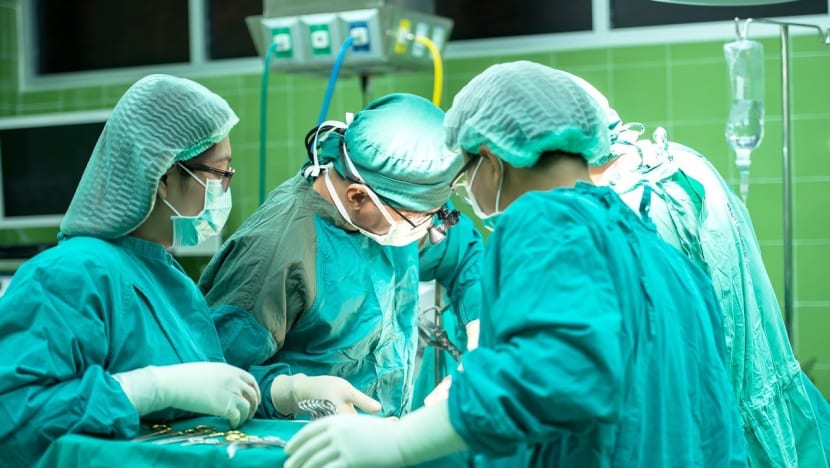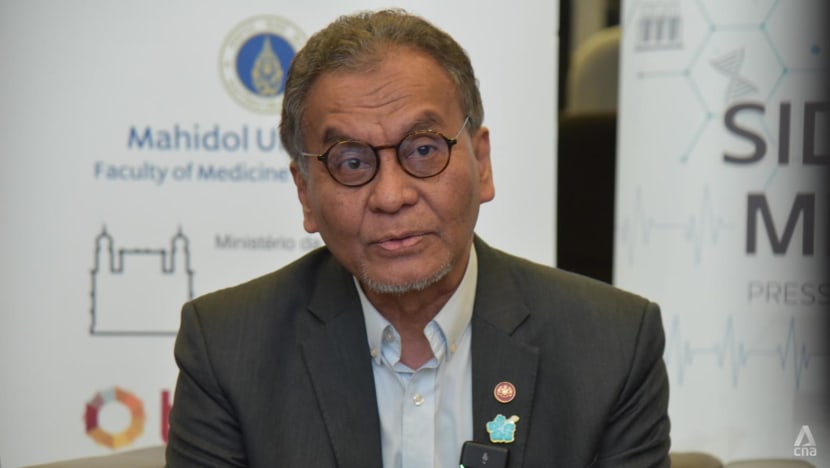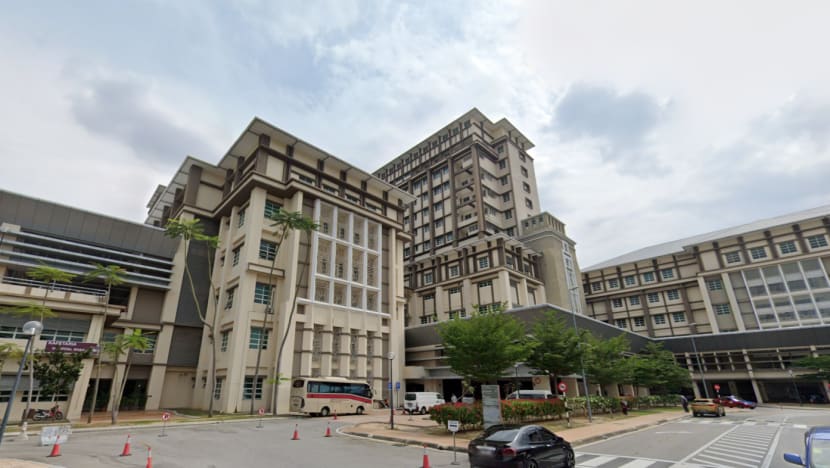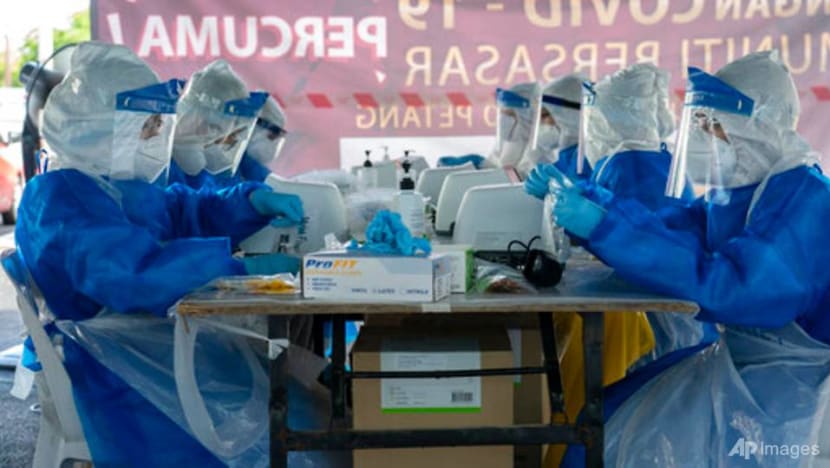A shortage of surgeons in Malaysia's public hospitals may further impact patients' quality of care, say experts
For instance, there are only 14 cardiothoracic surgeons serving in the seven public hospitals where heart surgery is performed in Malaysia. Beyond that, there is also a severe shortage of specialists in the fields of oncology, neurosurgery and paediatric surgery among others.

A file photo of surgeons in an operating theatre. (Photo: Pixabay/Sasint)

This audio is generated by an AI tool.
KUALA LUMPUR: At the Sultan Idris Shah Serdang Hospital in Selangor, there are an estimated 1,000 patients waiting in line for urgent life-saving heart surgery.
Meanwhile, at the Penang General Hospital, the waiting list for the same surgery has ballooned to about 850 people, while the waiting time at the Kuching General Hospital is more than a year.
“All these patients urgently need heart surgery. Heart conditions are unpredictable, and surgery should be done as soon as possible but there is a shortage of cardiothoracic surgeons in the public hospitals,” Malaysian Association for Thoracic and Cardiovascular Surgery (MATCVS) honorary secretary Dr John Chan Kok Meng told CNA.
He added that these surgeons are overworked, having to attend to emergency cases beyond their working hours.
Currently, there are only 14 cardiothoracic surgeons serving in the seven public hospitals where heart surgery is performed in Malaysia.
Three of these hospitals - in the cities of Kota Bharu in Kelantan, Kuantan in Pahang and Kota Kinabalu in the Borneo state of Sabah - only have one surgeon each.
In Malaysia, the issue of the lack of cardiothoracic surgeons has made headlines after four graduates of a “parallel pathway” training programme with the Royal College of Surgeons Edinburgh in cardiothoracic surgery filed a joint judicial review application in the Kuala Lumpur High Court.
They had contested the Malaysian Medical Council's (MMC) decision in December last year to deny their applications for the National Specialist Register (NSR) - a database of specialist medical practitioners in the country.
The MMC - a statutory body with appointed and elected medical professionals from various sectors that oversees policy for the medical profession in the country - said it did not recognise the qualification from the Royal College of Surgeons of Edinburgh, one that is recognised by Singapore and Hong Kong among others.
Healthcare experts whom CNA spoke to say that the issue skims the surface over the lack of medical specialists in the country, with some warning that the problem may get worse as Malaysia faces an ageing population.
And beyond that, they also said that the lack of specialists will also impact on the quality of care received by patients in the public healthcare system who may not have the means to seek help at private institutions.
The Academy of Medicine Malaysia (AMM) – a body that represents specialists - warned that there is an urgent need for the number of specialists in the country to be increased.
Its president Dr Rosmawati Mohamed told CNA that the population-to-specialist ratio in the country is 10,000 to four, lower than the Organisation for Economic Cooperation Development’s (OECD) "ideal ratio" of 10,000 to 14.3.
The OECD provides a forum in which governments can work together to share experiences and seek solutions to common problems and aims to promote policies that will improve the economic and social well-being of people around the world.
According to Health Minister Dr Dzulkefly Ahmad, there are 8,397 specialists currently serving at public healthcare facilities in 29 specialty areas.
Meanwhile, the Ministry of Health (MOH) has said that Malaysia needed around 18,912 and 23,979 specialists in the year 2025 and 2030, respectively.

URGENT NEED TO EXPAND NUMBER OF SPECIALISTS
Dr Rosmawati of AMM warned that Malaysia faces many challenges such as an ageing population, a high burden of non-communicable diseases such as diabetes, and an under-resourced delivery system.
And the problem is only exacerbated by the lack of medical specialists in the public healthcare sector.
Referring to the “ideal ratio” of 10,000 people to 14.3 specialists as recommended by the OECD, Dr Rosmawati stressed that “there is a very big gap” that Malaysia needs to catch up.
“This gap will not even be attained in the next 10 years, but the good news is there are attempts to make sure that specialist training is enhanced,” said Dr Rosmawati, pointing to the increased training specialist study slots for the Master’s Programmes in the country from 1,500 to 1,650 slots each year.
Meanwhile, Dr Hirman Ismail of the Health Ministry's Medical Development Division wrote in a paper published last year that about 15.7 per cent of doctors in the public sector were specialists.
He said that in developed countries such as Singapore, Japan, Canada, United States, Australia and the United Kingdom, the proportion of specialist doctors compared to non-specialists ranged from 41 per cent to 60 per cent.
“These advanced countries have a considerably high proportion of specialists among general physicians, and these include family physicians in primary care who are also regarded as specialist physicians in those countries,” he had written in the paper, proposing that at least 30 per cent of the total number of doctors in the public sector should be specialist doctors.
UNDERSERVED PUBLIC HEALTHCARE SECTOR
Universiti Kebangsaan Malaysia public health medicine specialist Prof Dr Sharifa Ezat Wan Puteh told CNA that the public healthcare sector was underserved.
Beyond the merely 14 cardiothoracic surgeons serving the public healthcare sector in the country, there is also a severe shortage of specialists in the fields of forensic pathology, family medicine, urology, oncology, general surgery, paediatric surgery, plastic surgery, neurosurgery, and psychiatry among others.
Prof Dr Sharifa anecdotally shared about a recently-diagnosed lung cancer patient from Johor Bahru she knows personally who had to wait for two months to get the results of an investigation for their condition.
“The test was done in Johor Bahru but it had to be sent to Kuala Lumpur where it was assessed. This is just one example. There are also children who have cancer but there are no paediatric oncologists in many areas,” she said.
The Malaysia Oncology Society was reported by Utusan Malaysia last year as saying that there were only 130 oncologists in the country, and they needed 300 oncologists as cases of cancer in the country continued to increase.
Prof Dr Sharifa said that while there was the option of going to private hospitals for those who could afford it, there were many - such as those from the lower-income group or those without medical insurance coverage - who were not able to do so.
“The majority of patients go to the public sector but it is hard to manage because there are just not enough specialists,” she said.
Dr Sharifa also believed that one of the issues faced by the government is that many specialists have chosen to go to the private sector or overseas where the remuneration is much higher.
A check on the NSR website showed that almost two-thirds of cardiothoracic surgeons in the country were in the private sector.
While there are no official numbers on this, doctors whom CNA spoke to said that those working in public hospitals had more work to do for much less money.
A doctor who undertook a parallel pathway training programme under Obstetrics and Gynaecology and is now waiting to be registered on the NSR told CNA that the lack of manpower in public hospitals caused frustration among many in the field.
Only those who have been registered with the NSR can practice in the private sector.
“There is only so much one can take in a system that is failing. I earn about RM10,000 (US$2,140) now, but if I can get into the private sector, I could easily earn at least three times that, and for a lesser workload. Of course you need to have the proper qualifications and experience,” said the doctor, who is currently working at a public hospital.
“As an individual who has needs and is being offered a better package, wouldn’t you take that? It doesn’t make you a lesser doctor.”

ISSUES WITH TRAINING SPECIALISTS
While the lawsuit involving the cardiothoracic surgeons against the MMC made headlines, it has also shone a spotlight on the pathways it takes to become a specialist doctor in the country.
In Malaysia, there are two ways of gaining a specialist qualification – via a master’s programme run by a local university or through the parallel pathway programme initiative that has been conducted by the health ministry since 2014.
Admissions to the local Master’s programmes are limited, with the parallel pathway programme allowing Malaysian healthcare professionals to seek specialist training for selected postgraduate studies via overseas qualifications.
Health Minister Dr Dzulkefly Ahmad told parliament on Jun 27 that there are 120 local Master’s programmes in medicine offered by nine universities and 14 specialties for parallel pathway programmes.
To date, Dr Dzulkefly said that 6,933 medical officers have received government scholarships for specialist training – 6,142 for local Master’s programmes and 791 for the parallel pathway programme.
A further 2,622 medical officers are undergoing the parallel pathway programme without a scholarship.
Dr Rosmawati, who is the AMM president, said that prior to 1973, almost all specialists obtained their training overseas or trained in Malaysia whilst attaining international qualifications by attempting international examinations to be recognised as specialists.
“It is an important part of the development of specialists in the country. Without it, there would be a lot less specialists,” she told CNA, adding that the parallel pathway programme currently represents a form of on-the-job structured training provided by MOH for trainees who have opted to sit for international examinations conducted by overseas Royal Colleges.
Dr Rosmawati said that the health ministry assists candidates in fulfilling a minimum of four years of supervised specialist training to gain the required competencies in their respective specialties, in addition to passing the specialist examination.
Former MMC member Dr Milton Lum said that local universities which started the specialist Master’s programmes since the 1980s have not produced sufficient specialists for the country’s needs.
“The gap has been filled somewhat by the Royal Colleges. The local universities performance is reflected in the National Specialist Register in which 47 per cent have Master’s and 53 per cent have Royal Colleges qualifications respectively,” he told CNA, adding that Malaysia has had a shortage of specialists for more than six decades, though there have been improvements since 2000.

Currently, the only specialist training programme for cardiothoracic surgery in Malaysia is a joint venture by Universiti Teknologi Mara (UiTM) and the National Heart Institute. But the programme is only open to Bumiputeras - an official term to describe Malays, the Orang Asli of Peninsular Malaysia, and various indigenous peoples of East Malaysia.
For the non-Bumiputera, their only option is to take the parallel pathway option such as the one offered by the Royal College of Surgeons of Edinburgh, an option that costs RM250,000 according to MOH for its entire duration.
The six-year programme includes five years’ of local training in cardiac centres in the MOH and the National Heart Institute (IJN), as well as one-year training in the United Kingdom.
While the NSR shows that Malaysian specialists holding this certification were registered in the past, MMC president Dr Radzi Abu Hassan in March said the council had never recognised cardiothoracic surgeons from the college.
In a statement on Mar 26, Dr Radzi - who is also Malaysia’s health director-general - said the MMC was not against any of the parallel pathway programmes nor were they being discontinued.
He said that the MMC’s interest is to ensure that the training programmes conducted in the country fulfill the relevant legal and statutory requirements.
“In fact, there are several programmes in the parallel pathway which have been recognised by the MMC, while in the case of those still not yet recognised, the relevant bodies have been informed to take steps to fulfill the relevant legal requirements for accreditation and recognition,” he had said.
Former Health Minister Dr S Subramaniam claimed that in the past few years there was a growing sentiment among a group of medical professionals that the local Master’s programmes should be strengthened while the parallel pathway programme should be phased out.
“But what we saw was the Master’s programme was not able to provide the number of places to train the number of specialists which we genuinely require,” he was quoted as saying by health news portal Code Blue.
In response to Dr Subramaniam, the “Group of Professors of Health and Medicine” as they call themselves claimed that the parallel pathway programmes were running for years without complying to local standards and laws.
The head of the group, Prof Dr Noor Hassim Ismail - a lecturer in Universiti Kebangsaan Malaysia (UKM) - claimed that the quality of these programmes is unknown because no third-party auditors are auditing the programmes regularly.
“In summary, we want to ensure that all medical specialist programmes follow the same procedures for accreditation and comply with existing local laws to preserve their quality,” he said in a statement that was published on Code Blue.
“We are concerned about the competency of graduates, and the safety of patients and the public. Not everyone can become a specialist; only those with capability and capacity can be trained as a specialist.”
WHAT DOCTORS ARE CONCERNED ABOUT
Meanwhile, a doctor who is undergoing specialist training under the parallel pathway programme at a hospital in the Klang Valley told CNA that he was worried that he would not be recognised as a specialist when he eventually completes his examinations.
He said that in the past few years, there was a growing fear that the parallel pathway programme was being sidelined, and not only for cardiothoracic surgery.
“I am worried that I will not be recognised as a specialist. I have put in a lot of time and effort, and I don’t want to see it being wasted,” the doctor told CNA on condition of anonymity.
Dr Dzulkefly - the country's health minister - said amendments would be made to the Medical Act to streamline irregularities linked to the specialist training programme involving parallel pathways and local master’s degrees.
“Engagements have been made with different stakeholders; we have engaged with everyone worth the salt,” he told parliament on Jun 27.
He pointed out that 35 cardiothoracic surgeons - in both private and public sectors - received their qualification from the Royal College of Surgeons Edinburgh.
“Suddenly we are questioning their safety, quality and their ability. I think it is not responsible to make innuendos and insinuations,” he said.
The proposed amendments were tabled in Parliament on Jul 15, with Dr Dzulkefly also saying that it aimed to enhance the quality of medical specialists produced through the two pathways to specialisation.
The Malaysian Medical Association (MMA) in a statement that day said that it hopes that all parliamentarians supported the amendments, saying that they were essential for ensuring that every Malaysian has access to high-quality, specialised medical care.
“By streamlining processes and maintaining professional oversight, we can create a more robust and flexible system for specialist training and recognition. These amendments will benefit both the parallel pathway and Master;s programs, ensuring that graduates from both routes have clear paths to specialist registration.
“The MMA hopes that with passage of these amendments, more doctors will take up specialisation, which is critically needed by the country,” MMA president Dr Azizan Ismail said.
But there is also opposition to any amendments, with UKM lecturer Prof Dr Noor Hassim for one saying that amending the Medical Act will affect the future of local programmes.
“We will be at higher risk of opening the floodgates to foreign programmes and specialists, even as other countries have tightened control over the influx of such programmes and specialists,” he claimed.




















